Your water softener has provided you with soft water for many years without any problems. But you are concerned about if the water softener resin inside of your water softener is still working as well as it used to. Is it time to replace the resin in your water softener?
In general, water softener resin only needs to be replaced when it has become damaged due to exposure to chemicals like chlorine, it has developed a permanent coating of iron or hard ions due to insufficient regeneration, or the characteristics of your water have changed.
Water softener resin is a very durable material that in many cases will not have to be replaced in a water softener for the life of the water softener.
Many experts suggest that water softener resin should be replaced every 15 – 20 years. But there are some circumstances where water softener resin can lose its ability to remove hardness from your water sooner and will need to be replaced.
How To Know When Your Water Softener Resin Needs To Be Replaced.
If your water softener is still using up salt from your brine tank but you are experiencing any of these symptoms, your water softener resin is no longer able to be properly regenerated and may need to be replaced.
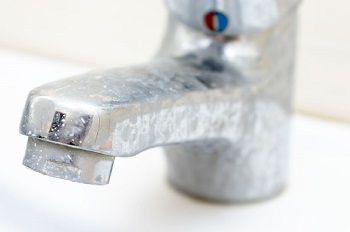
Hard Water Staining
When water softener resin is in good condition and your water softener is able to regenerate its water softener resin correctly, you should not experience any hard water staining or build-up.
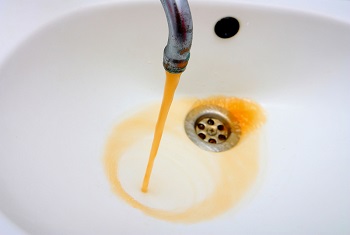
Iron Staining
When water softener resin is no longer able to remove iron from your water, the iron in your water can stain sinks, showers, and other surfaces.

Rotten Egg Smell
Certain types of water softener resins are able to remove low levels of odors from your water. But if the resin needs to be replaced, you may experience a rotten egg odor from your water.
These symptoms occur when your water softener resin is unable to remove hardness or iron from your water and with certain specialized water softener resin, you may experience a rotten egg odor from your water.
At some point, the water softener resin in your water softener will need to be replaced when you experience these symptoms but don’t replace the water softener resin in your water softener just yet!
Before you jump to the conclusion that you need to replace the water softener resin in your water softener, you should make sure that the water softener is working properly.
If your water softener is not drawing the brine from your brine tank properly, the water softener resin inside of your water softener may not be getting regenerated properly and therefore you could be getting hard water even though your water softener resin is perfectly fine.
If you are noticing the signs of hard water, that doesn’t always mean that the water softener resin in your water softener needs to be replaced.
A clogged or restricted brine injector or venturi can cause the brine from your brine tank to be less effective at regenerating the water softener resin in your water softener.
A kinked waste line on your water softener can cause back pressure which can prevent your water softener resin from being properly regenerated which will result in hard water.
See my article about how to maintain your water softener to check if your water softener is working as it should so you can determine if the water softener resin really needs to be replaced.
Water Softener Resin Needs To Be Replaced When It Has Been Damaged By Chlorine.
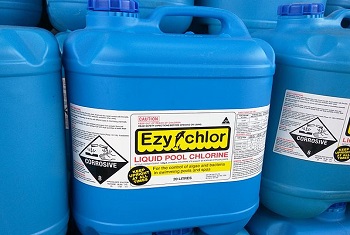
Chlorine is widely used to sanitize municipal water supplies to make the water safe for consumption. Unfortunately, municipal water suppliers rarely remove the excess chlorine that remains after the water has been sanitized.
This chlorine can work its way to your home but you may never even know that it is there because your water softener resin has been removing it from your water.
That may sound like a good thing, but when water softener resin adsorbs chlorine, the chlorine is slowly damaging the water softener resin and over time the chlorine will damage the resin to the point where it will be ineffective at removing hardness and iron from your water.
Chlorine can also cause your water softener resin to become soft and the resin can expand, taking up more space between resin beads causing a drop in water pressure.
When either of these symptoms occurs to water softener resin due to prolonged exposure to chlorine, the water softener resin will become ineffective and will need to be replaced.
Water Softener Resin Needs To Be Replaced When It Has Been Coated With Iron.
Dissolved iron in your water can stain your clothes, sinks, and showers, it tastes horrible and can even make your water smell bad.
Fortunately, even a basic water softener can remove dissolved iron from your water when set correctly.
Unfortunately, if your water softener does not remove all of the iron that it has removed from your water from its water softener resin, it can build-up to the point where the resin will need to be replaced.
A water softener that is not regenerating its water softener thoroughly may leave the iron behind after its regeneration process which over time can leave the resin unusable for effective water softening and iron removal.
When using a water softener for iron removal from your water, the resin needs a strong brine solution to keep iron from building up on the water softener resin.
Even letting your water softener run out of salt from time to time can be enough to allow the beginning of iron build-up on your water softener resin.
Because not all of the resin in your water softener is regenerated each time that your water softener regenerates, there can be iron left on some of the resin after regeneration.
If your water softener is not functioning correctly and not regenerating the water softener resin as thoroughly as it should, iron can continue to build up to the point where brine solution will not be able to remove the iron from the resin beads.
Even if the water softener resin is regenerated many times, the iron may not be completely removed from the resin and the resin should be replaced.
Water Softener Resin Needs To Be Replaced When It Has Become Worn Over Time.
Even if water softener resin is not exposed to chlorine or iron, the constant rubbing together of the resin beads against each other, the side of the water softener tank, and water sediment that can be drawn into the resin bed will wear away at the resin.
This constant contact with other surfaces can create small scratches and smooth areas on water softener resin that can affect how efficiently it can remove hardness from your water.
At some point, the water softener resin will become deformed to the point where it will only be able to remove minimal hardness from your water and it should be replaced simply because it has been worn down because of age.
For a properly sized water softener providing water to an average family of four, this may take 15 – 20 years which is right about the recommended time to replace the entire water softener.
Because the mechanical parts inside of a water softener control valve will wear over time as well as the water softener resin, after 15 -20 years of service, it is highly recommended to replace your entire water softener rather than just replacing the water softener resin.
Water Softener Resin Needs To Be Replaced When It Has Been Damaged By Phosphates.
There are certain specialized water softener resins available called silica crystal resins that are designed for unique water characteristics.
These resins are designed for the removal of high levels of dissolved iron from water as well as the removal of water hardness.
These silica crystal resins are chlorine resistant but can be damaged by phosphates that can be found in certain types of water softener salts.
When using silica crystal resins for water softening and iron removal, you should only use very pure salt that contains no additives or binders.
Pellett salts often contain phosphates that can damage the silica crystal resin over time which will result in needing to replace the resin.
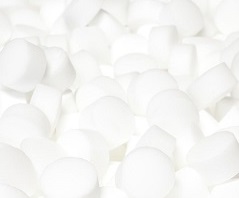
If you experience odors from your water softener that contains silica crystal resin, you may not need to replace the resin if the water softener is not regenerating the resin properly.
Check that your water is soft with a water hardness test kit to be sure that your resin is being regenerated properly, if you find that your water contains hardness, contact your water treatment service person to have your system checked out.
Water Softener Resin May Need To Be Replaced If Your Water Characteristics Have Changed.
In general, the hardness of water going into your home will not change considerably unless it comes into contact with different surfaces on its way to your home or your home is supplied by a different water source.
Local construction or changing from well water to a municipal water supply could mean a change in the water coming into your home.
Although a change in water hardness from a well can often be easily compensated simply by adjusting the hardness setting on your water softener, you may need to replace your standard water softener resin with a chlorine resistant resin if you change over to a municipal water source.
How Long Does Water Softener Resin Last?
Because standard water softener resin is made of polystyrene and divinylbenzene plastic, it can last for an indefinite amount of time.
Even when used in a water softener, water softener resin can last much longer than the water softener itself providing that it is regenerated properly and often enough.
How Much Does Water Softener Resin Cost?
Standard water softener resin is relatively inexpensive.
On average, one cubic foot of a highly recommended water softener resin will cost about $100 and up depending on where you purchase it.
You can also purchase water softener in smaller quantities if you don’t need a full cube.
You will most likely need between .75 – 1.5 cubes of water softener resin for most standard-sized water softeners, check your owner’s manual to determine how much water softener resin that you will need.
How Much Does It Cost To Have Your Water Softener Resin Replaced?
The cost to have your water softener resin replaced can vary significantly depending on the brand of water softener you have, the size of water softener that you have, the type of water softener resin that you will be getting, and of course the service company that you use.
I have found that some smaller companies may charge as little as $300 to replace the water softener resin in a smaller .75 cube water softener and around $500 for a 1.5 cube water softener.
But if you are getting your water softener resin replaced by a larger company that has far more overhead than a single-person company you could easily pay $600 – $1200 depending on the size of water softener that you have and the type of resin that you will be using.
Can I Replace My Water Softener Resin Myself?
You certainly can replace your water softener resin yourself if you are a little handy and have the time to do so. Be patient and have a helper with you if you can to make the process a little easier.
Replacing the water softener resin in your water softener is not rocket science but there are certainly a few things that you should be aware of before starting to replace your water softener resin yourself.
Check out this quick video on how to replace your water softener resin YOURSELF!


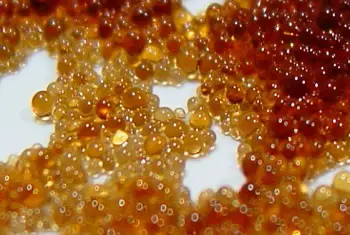

My softner resin ends up fouling in 3-4 years. Dosing with ResClean, etc, helps, but never gets it to new condition. I have an iron filter between the well and softener. Hardness is 45 grains and fleck 5600 analog on demand control head is set for 2 ppl @ 45 grains & 15lbs salt per regen. I’ve been using SolarSalt in brine tank. No rust staining, just poor softening (lack of soap suds) and have to manually regenerate. It does seem that recent purchases of resin (last 10 years) never perform / last as older resin products. Today, the resins all say Made in China. Are resins, manufactured, today, of lesser quality? Are there better grade resins made for very hard water? It’s been suggested to use another type of riser tube (turbulator).
Any suggestions?
Hello Mark and thank you for the question.
First:
Being that your water is exceptionally hard at 45 grains per gallon and you are using 15 pounds of salt per regeneration, your water softener resin is working overtime to soften your water so it will generally wear out quicker than with water with less hardness but here are some other things that could be affecting your resins effectiveness.
Second:
You mentioned that you have an iron removal system between your well and the softener. Some iron removal systems inject chlorine into the water to make dissolved iron “come out of solution” which means that the iron is no longer dissolved in the water and can be removed.
If chlorine from one of these iron removal systems is not removed before it gets to your water softener resin, it will damage the resin and make it gradually make it less efficient.
Third:
High TDS (Total Dissolved Solids, (often sodium)) (more than a few hundred) in water can inhibit water softeners efficiency and wear the resin out faster than normal overtime. Is your water normally quite salty? If so, you may want to check the TDS of your water, I have seen water with TDS above 2000 where even an over-sized water softener could barley soften the water because the high TDS would not allow the resin to remove all of the hardness.
I don’t believe that resin made now is any less effective now as it was several years ago as it is a simply product that should not vary much from one manufacturer to another.
I hope this was helpful!
Paul